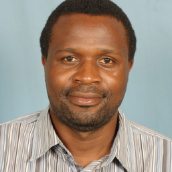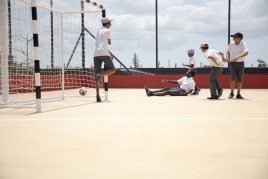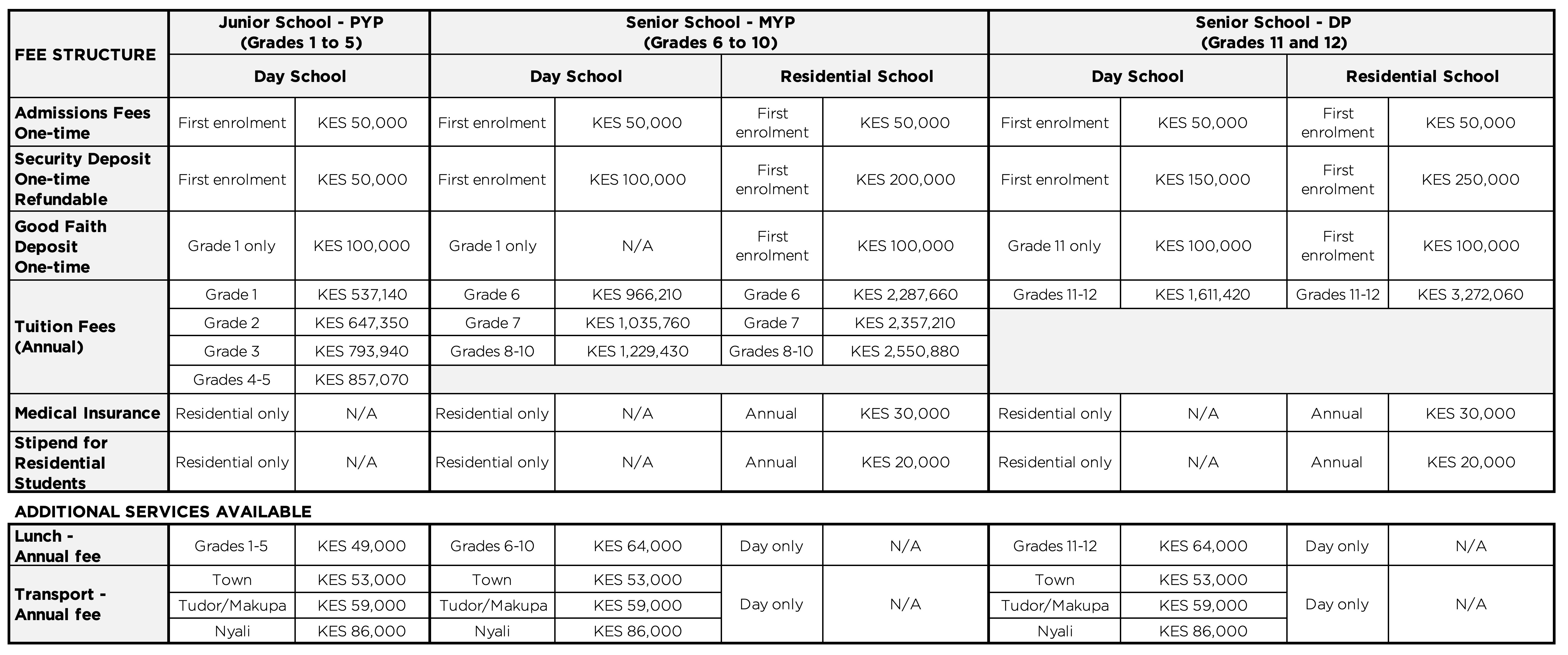Children Dare to Dream Big
Video by AFD – Agence Française de Développement about how children at the Aga Khan Academy Maputo "Dare to Dream Big" in their new school facilities. The Aga Khan Academy in Maputo, Mozambique has been growing since it opened its doors in 2013. The second phase extension was completed in early 2018 and included bigger classrooms, extended outdoor play areas, a library, an art room and a science lab.
Zviko Katsande: Zimbabwean educator embodies global-mindedness
Mwanapwani Said: Inspired to make a difference
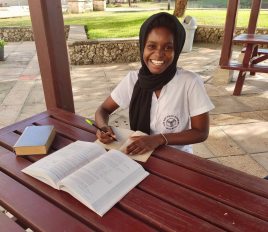 Year 10 student Mwanapwani Said, who comes from Msambweni in Kwale County, joined the Aga Khan Academy Mombasa in 2017 on a full scholarship through the Talent Identification Programme (TID). This programme is developed in line with the Academy’s vision to provide exceptional students with an international-standard education and leadership opportunities, regardless of their ability to pay.
Year 10 student Mwanapwani Said, who comes from Msambweni in Kwale County, joined the Aga Khan Academy Mombasa in 2017 on a full scholarship through the Talent Identification Programme (TID). This programme is developed in line with the Academy’s vision to provide exceptional students with an international-standard education and leadership opportunities, regardless of their ability to pay.
When she first received the news that she had been accepted to the Academy, Mwanapwani was elated and thankful. She was excited about studying under the Academy’s unique and holistic curriculum because she knew it was going to be a life-changing opportunity that would open many doors for her.
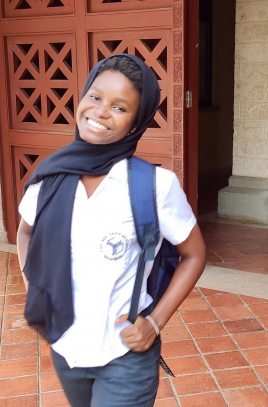 “I felt so grateful about receiving a full scholarship because it greatly reduced my financial burden. I became more driven than ever to create a fully rewarding experience for myself,” Mwanapwani said.
“I felt so grateful about receiving a full scholarship because it greatly reduced my financial burden. I became more driven than ever to create a fully rewarding experience for myself,” Mwanapwani said.
Having been at the Academy for nearly four years now, Mwanapwani has availed herself of every opportunity to strive for the better. Her growth has been reflected in academics as well as sports, where she has picked up a passion for football. In addition, being selected to participate in the Exchange Programme with AKA Hyderabad exposed her to a new culture, one that enabled her to gain an understanding of her identity and values whilst appreciating the varying perspectives of others.
Commenting on how the Academy has shaped her outlook on life, Mwanapwani stated: “The Academy has changed me for the better as I now know more about myself. Learning to have a pluralistic approach has taught me to be respectful of the opinions and values of others. I have also learnt to work well with others because I believe great things can be achieved when we work together and I feel like this is an important aspect that will help me in the future.”
"Mwanapwani is a very cheerful and conscious student. She is upbeat about life and hardly sees challenges as hurdles, but rather as trophies on her way up. Having been selected from TID, she has proved her mettle over the years in her Middle Years Programme. She is all-rounded, self-driven and radiates an aura of confidence around her peers. I consider myself fortunate to be around this positive personality," said Head of Residential Life Benson Wafula about Mwanapwani.
An aspiring health professional, Mwanapwani’s vision is crystal clear. She is duty-bound to make a difference.
“I feel like I have been prepared for the real world, to be mindful of others and to give back. I want to work hand in hand with members of my community to make a change in society.”
News
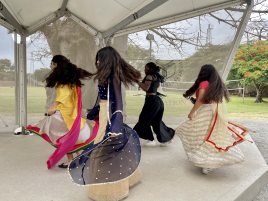
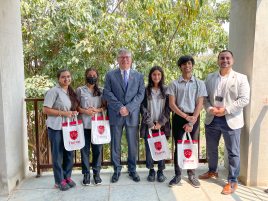

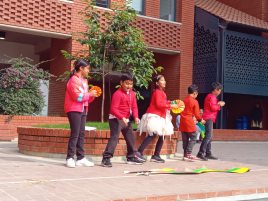
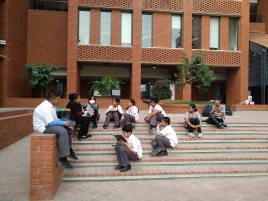
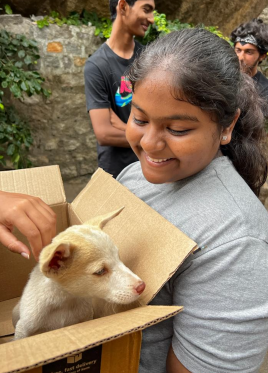
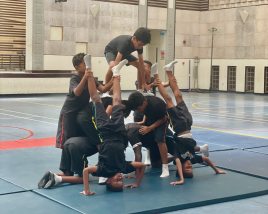
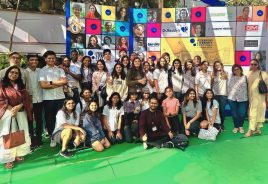
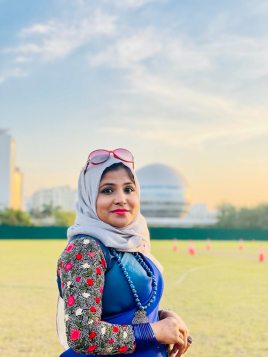
Pages
Areesh Rehmani: Exploring diverse cultures through languages and science
Thriving on the principles of linguistic diversity, pluralism and academic excellence, the Aga Khan Academy Maputo is the third Academy of the 18 Academies planned worldwide. Its rich atmosphere not only nourishes students to be active learners, but also encourages young minds on how to maintain a balance between sports, academics and cultural activities.
Areesh Rehmani, a grade 6 student at the Academy in Maputo, is one such determined and dedicated student. An active learner and passionate sportsperson, he is significantly involved with academic, leadership and sports activities. Not only is Areesh curious to learn about scientific innovations and technological growth, he is also enthusiastic to learn new languages and gain knowledge about diverse cultures.
One of the languages Areesh is learning is Portuguese. He proudly shares, “Learning Portuguese has had a very good impact on my life. I am now able to communicate well and when visitors come to my school I can converse in both languages (English and Portuguese).” Speaking both languages not only helps Areesh communicate with the local community, but also allows him to deepen his knowledge and learn from members of other communities as the Academy receives many visitors from Britain, Spain, Portugal and other countries.
Areesh also enjoys mathematics and science lessons. He explains, “Learning about new things has made a great difference. It is wonderful that now I am learning things that previously I didn’t know.” He speaks fondly about a science field trip he attended. The field trip was focused on educating the students about the cell theory in biology. He says, “We saw real cells. These living cells were put into slides and after observing them we had to draw them.” Areesh particularly loved this innovative way of learning. He continues, “Doing this activity, I realised how I enjoy drawing too. And since, this was something I had never done before or seen – it was really fascinating.”
On asking him how he likes the Aga Khan Academy Maputo campus, he says, “I really like the campus – especially the library. It’s such a colorful space because it has so many books. I also enjoy the IT room because we can use computers to learn. The science lab is also my favourite as here we can do many experiments, and I find science extremely engaging.” Some experiments Areesh and his classmates have conducted include researching about different organisms, using microscopes, and experiments to solve problems about mass and time.
He believes that classroom lessons such as these have also allowed him to become a better team player. He says, “I would define myself as a sportsman. I feel I am an active person. I enjoy sports activities like cycling, playing football, tennis and others. I’ve also played many football matches.” Areesh believes that sports make him more focused, and he is also happy when he is able to maintain a balance between sports and academics. Areesh has also participated in an inter-school football tournament where he was awarded the Man of the Match Award. Areesh says, “I was speechless, but also very grateful for such a wonderful opportunity.” Areesh’s favorite football player is Cristiano Ronaldo because he is respectful and honest.
In the future, Areesh hopes to visit the other Academies and learn more about other cultures and communities. Although learning about diverse cultures and languages excite him and are his passions, he believes that his career goals are more science and sports inclined. He aspires to be either a software engineer or a footballer. He says how earlier he wished to be an astronaut, but has realised how much he enjoys building new models. One day, Areesh hopes to use technology to create a positive impact in society.
Areesh believes the Academy’s learner profile has helped him define these ambitions and has improved him as a person. He says, “The learner profile helps me, and I learn more when I have the learner profile.” He affirms that adopting the qualities of the learner profile allows him to be a better student and a helpful person. The profile teaches him how to be more collaborative, and he is always ready to help any of his classmates with difficulties in academics or in other areas. Areesh explains, “In MYP (Middle Years Program) we have a whole group and we stay together. We have a united class and we are all very helpful and kind towards each other.” He believes, “Unity is the first step to success. Nothing can be done without unity. We all help each other and we grow together.”
By Khushboo Shah
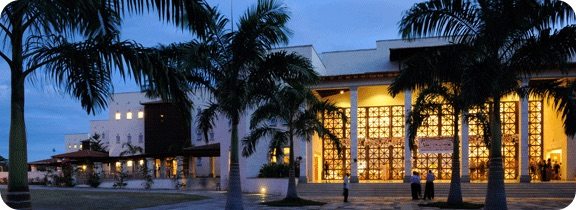
Fee Schedule
Fee Schedule for the 2024-2025 Academic Year.
Please click here to download the 2024-2025 Academic Year Fee Schedule (PDF format)
The above fees are applicable for the Academic year 2024-2025 and are subject to an annual review.
The Tuition fees include course fees, the use of essential course books, library books, co-curricular activities, IT infrastructure, science laboratory equipment, day trips, and certain classroom supplies.
The Residential fee in addition to the tuition fee also includes housing, weekend excursions and activities, laundry, and meals.
Notes
1. Miscellaneous Charges
1.1 Non-Refundable Admission Fee. Payable for students enrolling for the first time. The admission fee must be paid to secure a place for a child in the Academy.
This cannot be deferred or paid in instalments. The due date is one week after the offer has been accepted.
1.2 Refundable Security Deposit. Around 10% of the fees are payable on acceptance of admission and
should be paid together with the admission fee mentioned above. As the Security Deposit is different between
the PYP, MYP and DP, the differential will be invoiced when the child is transferred from PYP to MYP and from
MYP to DP. It is refundable when a student leaves the school as long as the required notice has been given in
writing and “No Dues” clearance is obtained from the Academy. No interest is payable on this deposit.
1.3 Good Faith Deposit. Paid for Grade 1, Grade 11 day students and all residential students to secure their
place, as part payment against their first Semester fee, due to limited capacity. This will have to be paid as soon
as the admission of the student is accepted for new joiners (including Grade 1)students and before 30 April for the
Grade 11 Students. All other residential students will pay the Good Faith deposit together with the Admissions Fee.
In the event that the student does not join the Academy, this deposit will not be refunded.
1.4 Lunch. The rates indicated above are applicable only if paid in advance at least for a whole semester
(50% of the total cost). The daily lunch rate is KES 400 for MYP and DP students and KES 350 for PYP students.
1.5 Medical Insurance Premium. Paid separately by residential students with the first tuition fee instalment.
1.6 Stipend. Paid separately by residential students and will be managed by the Academy. The students will be
able to withdraw a maximum KES 500 per week to cover any personal expenses. Any balance with the Academy will
be paid to the students at the end of the Academic Year.
2. Tuition
2.1 Sibling Discount. 5% is applicable for the second child, 10% for the third child, and 15% for the fourth and subsequent children. The discount will be adjusted according to the number of
children attending the Academy at the same time. This discount is not applicable where a family is receiving financial assistance.
2.2 Tuition Fee. Academic Year 2024-2025 fees are payable in two equal instalments (for each Semester), no later than 15 July 2024
and 15 December 2024.
2.3 Discount of 3% will be given on the tuition fees if paid for the whole year before the deadline (15 July 2024). These discounts
are applicable on the net amount payable after other discounts have been deducted and is not applicable to the families who receive
financial assistance.
2.4 AKDN Discount. AKDN employees, upon confirmation with any of the AKDN agencies, will get the following discount:
20% for residential students and 5% for any day students.
2.5 Currency. The fees can be paid in US dollars or Kenyan Shillings. The US Dollars fees will be indicated on the invoice using the exchange rate at which the banks are buying USD from the Academy. The Academy however reserves the right to change this policy.
3. Late and Outstanding Fees
3.1 A monthly surcharge of 3% will be added to the total outstanding dues older than 30 days.
3.2 If fees are not paid within one month’s period following the deadline, the student will be asked to stay at home or in the residences and will not be allowed to attend classes or participate in the other activities undertaken by the Academy. If the fees for the residential students are not settled within 2 weeks following the student being withdrawn from classes, the school may send the student back home. Any student who is out of classes for over 4 weeks could be asked to withdraw from school.
3.3 The Academy reserves the right to withhold results, school certificates, transcripts, or any other information and/or document until all outstanding dues are settled in full.
4. Financial Assistance
Newly admitted students who demonstrate financial needs can apply for Financial Assistance
through the Admissions office immediately after the admission has been confirmed. All current
students have to submit their applications before 8 March, 2024. An independent Committee is
responsible for reviewing and approving any request for Financial Assistance.
5. Withdrawal
If a student wishes to leave the Academy, three months’ advance notice of withdrawal must be given in writing and if not done the pro-rated three months' fees will be due and payable. School clearance will not be possible until any outstanding dues are settled in full.
6. Other Education-related costs
6.1 Field Trips. Students are expected to participate in compulsory curriculum and bonding trips as well as optional trips, for which the parents will be invoiced separately. Information on these field trips will be shared with parents at least one month in advance.
6.2 Exam fees. MYP and Diploma will be billed separately based on actual fees from the International Baccalaureate Organization (IBO).
6.3 Personal Computer. MYP and DP students are required to own a personal computer that meets minimum performance standards as most of the assignments as well as the communication between the teachers and the students are computer-based. The system should be loaded with either iOS or Windows, MS Office, Internet browser, and Antivirus.
7. General Notes Regarding Payment
7.1 The Academy does not accept cash for fee payments.
7.2 All payments must be made by direct bank deposit, bank transfer, or M-pesa even if payment is made by a third party such as a sponsoring organisation.
7.3 Parents are responsible for ensuring that the fee payments are made into the correct bank account of the Academy. In the unlikely event of any change in the bank account, the changes will be communicated to parents in writing via a hand-delivered letter from the Academy.
7.4 Parents must provide the finance office (mba-bursar@agakhanacademies.org), with a hard or an electronic copy of the proof of payment showing the full name of the student and Student Identification Number as soon as the funds have been transferred for issuance of payment receipt. The absence of this information may delay crediting the fees reflected on your account in our system.
7.5 The above terms and conditions may be modified, or new terms may apply to reflect changes in the law or our services. For further information please contact us at mba-bursar@agakhanacademies.org
8. Note on disclosure and sharing of student-related data and information:
Schools will store and may disclose and share information such as a student's name, address, telephone number, date and place of birth, honours and awards, exam papers and other works of the student, parents’ contact and other details, fees charged and outstanding fees against the student, and dates of attendance with third parties as and where is required for the normal operations of the school. The fees-related information can be shared with third parties to assist the school to collect fees where the payments have been delayed and not made for the services provided as per the above term.
Student experience at 2016 Peace Summit
The Peace Summit is an annual event conducted over a period of two days by the DP1 cohort for Year 9. It is one of the most actively student-driven events at AKA Mombasa. Preparation for the Peace Summit begins well in advance, with DP1 students starting to work on their modules since August last year. The main aims of this Peace Summit were to make us believe that peace is possible, empowering us to be leaders, showing us how to work together to resolve conflicts, and devising sustainable solutions to global issues. The main theme of this year’s Peace Summit was Conflict Over Resources, and our first activity at the Peace Summit was the Hunger Banquet.
The Hunger Banquet was an activity where Year 9 students were divided into three groups; low-income, middle-income, and high-income. Each group was treated differently according to their socioeconomic status. The poor people were given boiled rice, the middle class was served cake, and the rich people were provided with a proper breakfast. We were all in a place where we could clearly observe how the other groups were being treated. The Hunger Banquet was a very accurate depiction of our world today - less than one percent of the global population being rich, and the majority being poor. After this activity we concluded that the cycle of poverty affects generations and is really hard to escape. Also, the rich people group was only able to help a small number of poor people, which showed how the rich don’t have a large-scale impact on alleviating poverty. The Hunger Banquet was an amazing introduction as it made us think of sustainable solutions to breaking out of the cyclical nature of poverty – which was what the Peace Summit was mainly about.
We had two guest speakers come in during the Peace Summit to enhance our knowledge; the Manager of Facebook in Kenya, and a member of the COBURWAS. The Manager of Facebook in Kenya, Naheed Hirji, talked about how the internet can be used as a tool to create peace if used in the right manner, and how it has previously been used to destroy peace. He talked about the ways the world has improved due to technological advancement and also discussed the pros and cons of the internet. Our second guest speaker, Joseph Munyambanza, was a Congolese person who had lived in Uganda for most of his life and had worked in refugee camps on providing children education for a brighter future. He enlightened us with his journey and explained how his programmes help children in acquiring quality education. The two speeches were of great benefit to us, as they educated us about real-life attempts to create peace.
During the modules of the Peace Summit, we talked about different crises around the world and proposed possible solutions to them. We used many case studies such as – Coltan mining in DRC, and the water crises between Tajikistan and Uzbekistan. We talked about all sorts of things during these modules, analyzing each of these situations in-depth and suggesting better solutions for each issue. The Peace Summit provided us with a platform to debate current issues, propose solutions for them, and also reflect on them critically. These two days greatly helped us realize how privileged we are to have all the resources we do and to live in an environment much safer than many children who are currently suffering. It also made us believe that we can make a change, no matter how small – it will definitely impact the world in one way or another. We are all part of this world and we all contribute to the problems of the world in a positive or negative manner – so let’s make it positive and work on resolving the problems in our world. Let’s Make A Change!
--Tabreek Somani, Year 9 (The Reporters)
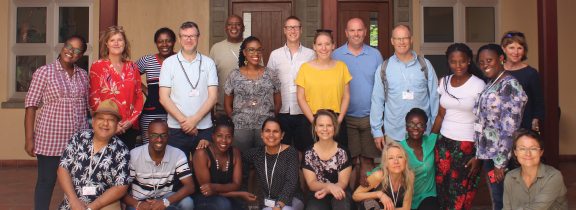
IB Workshops
We are excited to announce that our IB workshop for this year will be held virtually and will take place from 21–23 June 2025.
About our IB Workshops
The Aga Khan Academy Mombasa offers authorised IB teacher training workshops for the Primary Years Programme, Middle Years Programme and Diploma Programme teachers.
To accommodate a diverse range of learners, the IB workshops are designed for both new and experienced teachers interested in increasing their knowledge and expertise about the IB programme.
The workshops include strategies and techniques for teaching IB courses effectively in the classroom and are led by highly trained IB experts. Each workshop allows teachers to assess and build their skills in the curriculum as well as understand and compare assessment criteria.
The workshops offer teachers a chance to interact directly with and share their input with workshop leaders. They also allow the participants to discuss and share their ideas, practices and strategies while working alongside other IB teachers from a broad range of backgrounds.
Workshop fees
The workshop fee is $650.
An invoice will be sent to you once we receive the payment confirmation. The fees must be paid in full before the deadline and a receipt will be issued.
Registration form
To register click here.
For any queries, please contact us at workshops@agakhanacademies.org.
Walk for Freedom
On October 14th, students from the Aga Khan Academy Mombasa joined tens of thousands of people around the world to fight against human trafficking.
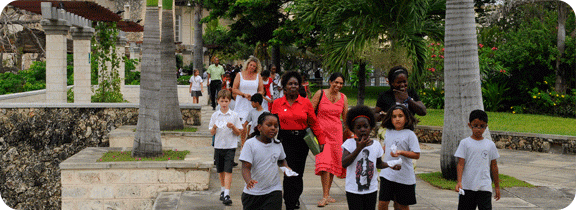
Financial Assistance
Admission to the Academy is based on merit and is means-blind. Students from all socio-economic backgrounds who satisfy the requirements for entry are encouraged to apply.
Partial to full financial aid is available to accepted students with a demonstrated need. However, the Academy cannot guarantee that all applicants will be awarded financial aid. Financial aid awards are reviewed annually and renewed only after reassessment of financial need. Financial aid is mainly for Kenyan nationals but a small number of students from other countries in East Africa have received partial awards.
For information about admission, scholarships and financial aid please contact the admissions office.
